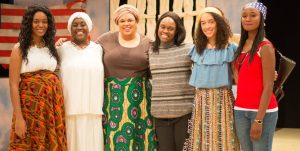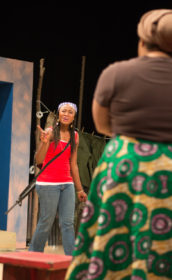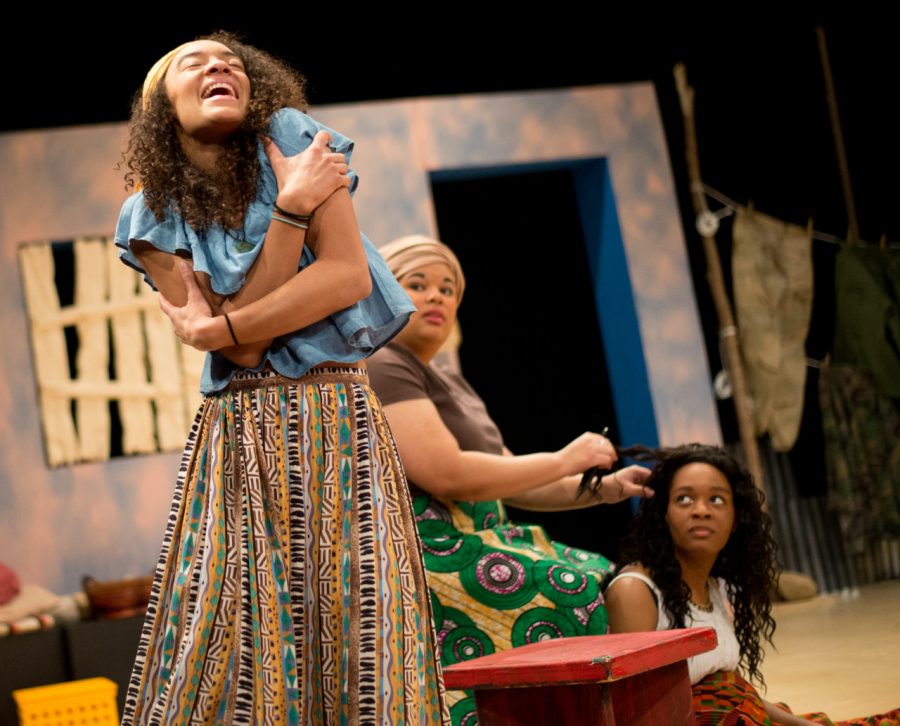Liberia, meaning “land of freedom,” is a nation of hope founded by freed slaves from the United States on their return to Africa. Free is not what the people of Liberia are, however. People in Liberia die an average of 19 to 22 years younger than their American counterparts, according to BBC News. What was once one of the most stable African countries is now plagued by corruption. The city buildings are mostly destroyed. As yesliberia.org says “one of the most prosperous black republics in the 1950s” has nearly “800,000 displaced” and “200,000 dead” after seven years of civil war. “One of Africa’s bloodiest civil wars” ended in 1996 — this is the story of “Eclipsed”.
“Eclipsed” features a handful of women who banded together and protested the government to end violence. These women participated in sit-ins, sex strikes, group prayer and song. Mckenna Jensen, who performs as Helena, said,”These people are refugee women of color. If that’s not relevant right now, I don’t know what is.” Quite simply this is a play about women, about people, half a world away set a mere 20 years in the past, who are fighting for the right to exist without fear. According to Jensen, “Eclipsed” is a play about the “resilience of the human spirit.”
 Director Stephanie Weeks has been drawn to “Eclipsed” since its inception when she was offered an understudy role. This play became the first female all black cast and production team to premiere on Broadway. “There are not enough of our stories being told,” she said. Though the play is quite violent, Weeks wants people to know there are also “moments of levity” and that “it is okay to laugh.”
Director Stephanie Weeks has been drawn to “Eclipsed” since its inception when she was offered an understudy role. This play became the first female all black cast and production team to premiere on Broadway. “There are not enough of our stories being told,” she said. Though the play is quite violent, Weeks wants people to know there are also “moments of levity” and that “it is okay to laugh.”
A play about war halfway around the world may seem distant and unimportant, but Weeks explained, “these women are 18, 19, 25 and have been through a lot.”
“This could be [our] lives,” Weeks said. “It’s a reminder of how easily all of us could be in that situation.” This is the story of the power of women protesting and demanding that their voice be heard in a world that doesn’t want to listen. Rehearsals started the day after the women’s march in New York and, according to Weeks, “any woman in the world right now can talk about being voiceless and systematically put down.”
“any woman in the world right now can talk about being voiceless and systematically put down.”
Make no mistake, “Eclipsed” is not about politics — it’s about women, women who tried to create change and succeeded. “[It’s about] what war does, not just to the soldiers,” Weeks said. “They are not pieces to be maneuvered and often women and children are affected the most.”
A perfect example of this is the first black female president happens to be president of Liberia. Ellen Johnson Sirleaf, in her acceptance speech for the Nobel Peace Prize, she acknowledged and honored te “memory of countless women whose efforts and sacrifice will never be recognized but who, in their private and silent struggles, helped to shape our world.” This single mother of three who has managed not only to make her voice heard but rose to lead a broken country is exactly the kind of woman portrayed in “Eclipsed”.
The show will run in the Performing Arts Building, room 115 March 3-11 at 7:30 p.m. and a 2:00 p.m. Saturday matinee. A talk-back will be featured on March 10.
This show makes history as much as it tells its untold stories. “A woman’s worthlessness can’t happen,” Weeks said.


